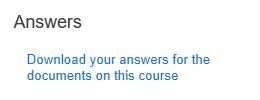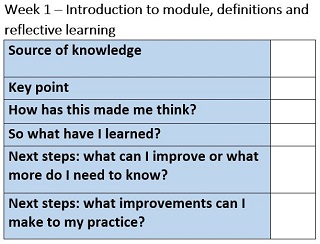Module structure
The module is designed to be studied over six weeks. The content for each week should take around two hours and is divided into four sections. However, every learner is different, and you may find that you take less or more time to complete a piece of learning.
Please take as long as you need to complete the tasks. You may find it helpful to plan your study in advance.
Each week will start with an introduction and an explanation of the week’s learning outcomes. There will be a variety of learning activities, including films, audio recordings and readings. There will be activities to encourage you to reflect on your thoughts and learning after you have completed the activity.
As you work through the course you can save the text you put in the text boxes. This will be available to you any time that you log in to the course. If you want to download any activity answers and any text that you typed and saved in answer boxes, go to the ‘Answers’ box in the left-hand margin and click on ‘Download your answers for the documents on this course’ (see below).

There are extension activities to complete at the end of each session if you wish to further your knowledge each week.
Very importantly, there will be practical tips to develop your knowledge and help you when working with children who require additional support.
Reflecting on your learning
You will be asked to reflect on your learning in the final part of each week. To help you do this there is a downloadable learner journal that has a reflection table to complete for each week. This is where you can make a note of the learning you have taken from the week’s activities. You can also consider what impact the activity will have on your practice in order to improve the experience for children who require additional support.
Learner journal – click image below
 [Tip: hold Ctrl and click a link to open it in a new tab. (Hide tip)]
[Tip: hold Ctrl and click a link to open it in a new tab. (Hide tip)]
(Adapted from Appleby and Hanson, 2017)
Independent study
The content of all the study weeks (apart from Week 3, which contains the webinar) is designed for you to learn independently. In Week 1 there is a section to help you get organised for independent learning and also a part that delivers hints on how to make the most of your studying.
Glossary
Throughout the module, highlighted words will be defined in the glossary.
Collaborative learning
Week 3 is an opportunity for you to take part in an online webinar. You can swap ideas and ask questions with other practitioners who are also taking the module. The aim is to share your ideas, learn from each other and reflect on your learning and experience. There are more instructions of how to access the webinar in Week 3.
There is also a module forum for you to engage with other participants on the course. Please use it to ask questions or discuss any issues that arise as you study. You should be aware that the forum is moderated, so please keep all posts course- and webinar-specific, and always remain respectful to your fellow learners.
If you’d like to post a question or comment, click on the button ‘Start a new discussion’, making sure that you include a title in the subject line.
Getting a badge
This is a badged module. At the end of Weeks 4 and 6 you can complete a quiz in order to gain your badge.
Quizzes are a series of questions that assess your learning. The question types will include multiple choice, true/false, or matching exercises. To help familiarise you with doing the quizzes, there are practice quizzes at the end of each week (apart from Week 3) that will not count towards your badge.
Taking part in a quiz helps you to review and reflect on what you have read and heard. The quizzes have been designed to help you test your knowledge and your thinking. Some questions review facts and have clearly correct answers, but as you’ll appreciate ideas and concepts in this course do not fit easily into yes or no answers. If you find that your answer is incorrect or partially correct consider this response in the way that you would experience disagreement in a professional dialogue. We encourage you to think about the reasons why we might have come to a different conclusion to you. Please try the quiz question again. If you feel that you strongly disagree with any of the answers please post your thinking in the forum.
Scottish Government and the law
